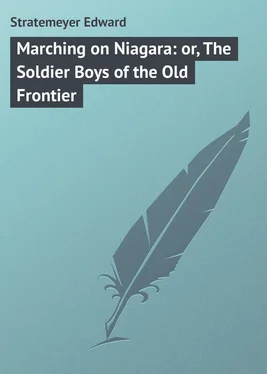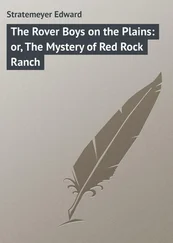Edward Stratemeyer - Marching on Niagara - or, The Soldier Boys of the Old Frontier
Здесь есть возможность читать онлайн «Edward Stratemeyer - Marching on Niagara - or, The Soldier Boys of the Old Frontier» — ознакомительный отрывок электронной книги совершенно бесплатно, а после прочтения отрывка купить полную версию. В некоторых случаях можно слушать аудио, скачать через торрент в формате fb2 и присутствует краткое содержание. Жанр: foreign_prose, на английском языке. Описание произведения, (предисловие) а так же отзывы посетителей доступны на портале библиотеки ЛибКат.
- Название:Marching on Niagara: or, The Soldier Boys of the Old Frontier
- Автор:
- Жанр:
- Год:неизвестен
- ISBN:нет данных
- Рейтинг книги:4 / 5. Голосов: 1
-
Избранное:Добавить в избранное
- Отзывы:
-
Ваша оценка:
- 80
- 1
- 2
- 3
- 4
- 5
Marching on Niagara: or, The Soldier Boys of the Old Frontier: краткое содержание, описание и аннотация
Предлагаем к чтению аннотацию, описание, краткое содержание или предисловие (зависит от того, что написал сам автор книги «Marching on Niagara: or, The Soldier Boys of the Old Frontier»). Если вы не нашли необходимую информацию о книге — напишите в комментариях, мы постараемся отыскать её.
Marching on Niagara: or, The Soldier Boys of the Old Frontier — читать онлайн ознакомительный отрывок
Ниже представлен текст книги, разбитый по страницам. Система сохранения места последней прочитанной страницы, позволяет с удобством читать онлайн бесплатно книгу «Marching on Niagara: or, The Soldier Boys of the Old Frontier», без необходимости каждый раз заново искать на чём Вы остановились. Поставьте закладку, и сможете в любой момент перейти на страницу, на которой закончили чтение.
Интервал:
Закладка:
Edward Stratemeyer
Marching on Niagara Or The Soldier Boys of the Old Frontier
PREFACE
"Marching on Niagara" is a complete story in itself, but forms the second of several volumes to be known by the general title of "Colonial Series."
In the first volume of this series, entitled "With Washington in the West," we followed the fortunes of David Morris, the son of a hardy pioneer, who first settled at Will's Creek (now the town of Cumberland, Virginia), and later on established a trading post on one of the tributaries of the Ohio River. This was just previous to the breaking out of war between France and England, and when the French and English settlers in America, especially in those localities where trading with the Indians was profitable, were bitter foes. David becomes well acquainted with Washington while the latter is a surveyor, and when Braddock arrives in America and marches against Fort Duquesne the young pioneer shoulders a musket and joins the Virginia Rangers under Major Washington, to march forth and take part in Braddock's bitter defeat and Washington's masterly effort to save the remnant of the army from total annihilation.
The defeat of the British forces left this section of the English colonies at the mercy of both the French and their savage Indian allies, and for two years, despite all that Washington and other colonial leaders could do, every isolated cabin and every small settlement west of Winchester was in constant danger, and numerous raids were made, savage and brutal in the extreme, and these were kept up until the arrival of General Forbes, who, aided by Washington and others, finally compelled the French to abandon Fort Duquesne, and thus restored peace and order to a frontier covering a distance of several hundred miles.
Following General Forbes's success at Fort Duquesne (now the enterprising city of Pittsburg), came English successes in other quarters, not the least of which was the capture of Fort Niagara, standing on the east bank of the Niagara River, where that stream flows into Lake Ontario. This fort was of vast importance to the French, for it guarded the way through the lakes and down the mighty Mississippi to their Louisiana territory. In the expedition against Fort Niagara both David and Henry Morris take an active part, and as brave young soldiers endeavor to do their duty fully and fearlessly.
In the preparation of the historical portions of this work the author has endeavored to be as accurate as possible. This has been no easy task, for upon many points American, English, and French historians have differed greatly in their statements. However, it is hoped that the tale is at least as accurate as the average history, giving as it does statements from all sides.
Again thanking the many readers who have taken such an interest in my previous works, I place this volume in their hands, trusting they will find it not only entertaining but likewise full of instruction and inspiration.
Edward Stratemeyer.
Independence Day, 1902.
CHAPTER I
IN THE FOREST
"Do you think we'll bag a deer to-day, Henry?"
"I'll tell you better about that when we are on our way home, Dave. I certainly saw the hoof-prints down by the salt lick this morning. That proves they can't be far off. My idea is that at least three deer are just beyond the lower creek, although I may be mistaken."
"I'd like to get a shot at 'em. I haven't brought down a deer since we left the army."
"Well, I reckon we had shooting enough in the army to last us for a while," returned Henry Morris, grimly. "I know I got all I wanted, and you got a good deal more."
"But it wasn't the right kind of shooting, Henry. I always hated to think of firing on another human being, didn't you?"
"Oh, I didn't mind shooting at the Indians – some of 'em don't seem to be more than half human anyway. But I must say it was different when it came to bringing down a Frenchman with his spick and span uniform. But the Frenchmen hadn't any right to molest us and drive your father out of his trading post."
"I'm afraid General Braddock's defeat will cause us lots of trouble in the future. Mr. Risley was telling me that he had heard the Indians over at Plum Valley were as impudent as they could be. He said half a dozen of 'em made a settler named Hochstein give 'em all they wanted to eat and drink, and when the German found fault they flourished their tomahawks and told him all the settlers but the French were squaws and that he had better shut up or they'd scalp him and burn down his cabin."
"Yes, Sam Barringford was telling something about that, too, and he said he wouldn't be surprised to hear of an Indian uprising at any time. You see, the French are backing the redskins up in everything and that makes them bold. If I had my way, I'd get Colonel Washington to raise an army of three or four thousand men – the best frontiersmen to be found – and I'd chase every impudent Frenchman out of the country. We won't have peace till that is done, mark my words on it," concluded Henry Morris, emphatically.
David and Henry Morris were cousins, living with their folks on a clearing not far from what was then known as Will's Creek, now the town of Cumberland, Virginia. The two families consisted of Dave and his father, Mr. James Morris, who was a widower, and Mr. Joseph Morris, his wife Lucy, and three children, Rodney, the oldest, who was something of a cripple, Henry, who has just been introduced, and little Nell, the sunshine of the whole home.
In a former volume of this series, entitled "With Washington in the West," I related the particulars of how the two Morris families settled at Will's Creek, and how James Morris, after the loss of his wife, wandered westward, and established a trading-post on the Kinotah, one of the numerous branches of the Ohio River. In the meantime Dave, his son, fell in with George Washington, when the future President was a surveyor, and the youth helped to survey many tracts of land in the beautiful Shenandoah valley.
At this time the colonies of England and of France in America were having a great deal of trouble between themselves and with the Indians. Briefly stated, both England and France claimed all the territory drained by the Ohio and other nearby rivers, and the French sought in every possible way to drive out English traders who pushed westward.
The driving out of the English traders soon brought trouble to James Morris, and after being attacked by a band of Indians he was served with a notice from the French to quit his trading-post in three months' time or less. Unwilling to give up a profitable business, and half suspecting that the notice was the concoction of a rascally French trader named Jean Bevoir, and not an official document, Mr. Morris sent Dave back to Winchester, that they might get the advice of Colonel Washington and other officials as to what was best to do.
When Dave arrived home he found that there was practically a state of war between the French and English. Washington was preparing to march against the enemy, and to get back to the trading post unaided was for the youth out of the question. Such being the case, Dave joined the Virginia Rangers under Washington, and with him went his cousin Henry, and both fought bravely at the defense of Fort Necessity, where Henry was badly wounded.
The defeat of the English at Fort Necessity was followed by bitter news for the Morrises. Sam Barringford, a well-known old trapper of that locality, and a great friend to the boys, came in one day badly used up and with the information that the trading-post had fallen under the combined attack of some French led by Jean Bevoir and some Indians led by a rascal named Fox Head, who was Bevoir's tool. James Morris had been taken prisoner and what had become of the trader Barringford could not tell.
Читать дальшеИнтервал:
Закладка:
Похожие книги на «Marching on Niagara: or, The Soldier Boys of the Old Frontier»
Представляем Вашему вниманию похожие книги на «Marching on Niagara: or, The Soldier Boys of the Old Frontier» списком для выбора. Мы отобрали схожую по названию и смыслу литературу в надежде предоставить читателям больше вариантов отыскать новые, интересные, ещё непрочитанные произведения.
Обсуждение, отзывы о книге «Marching on Niagara: or, The Soldier Boys of the Old Frontier» и просто собственные мнения читателей. Оставьте ваши комментарии, напишите, что Вы думаете о произведении, его смысле или главных героях. Укажите что конкретно понравилось, а что нет, и почему Вы так считаете.












